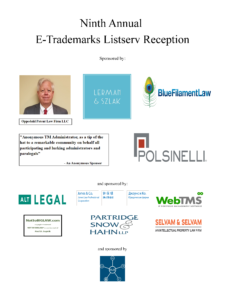Sometimes a trademark practitioner will have a pending US trademark application (“the Junior Application”) that has been suspended pending the disposition of an earlier application (“the Senior Application”). And sometimes the Senior Application will “have one foot in the grave” in the sense that it has received a Notice of Allowance and has not, apparently, timely filed a Statement of Use. In such a case, the natural question is, how long does it take the USPTO to get around to formally declaring the Senior Application abandoned? I looked at a couple of recent cases to see. Continue reading “How long it takes USPTO to declare a trademark application abandoned?”
Today is the day for Canada and Madrid Protocol
 Today is the day! The Madrid Protocol enters into force today with respect to Canada. Continue reading “Today is the day for Canada and Madrid Protocol”
Today is the day! The Madrid Protocol enters into force today with respect to Canada. Continue reading “Today is the day for Canada and Madrid Protocol”
E-Trademarks listserv reception was a success!
[ngg src=”galleries” ids=”1″ display=”basic_slideshow”]The ninth annual E-Trademarks Listserv reception took place on Tuesday, May 22 in Boston. It was a complete success. Thanks to Will McGuire for these great photographs!
Meet the Bloggers XV was a success!

The sponsors for the Ninth Annual E-Trademarks Reception
Let’s thank our sponsors for the E-Trademarks reception that will take place next week (brochure page).
As you by now have heard, one of our sponsors is anonymous! See https://blog.oppedahl.com/?p=4496 .
The reception brochure is here: https://blog.oppedahl.com/?p=4307
Our first tier of sponsors is:
- Oppedahl Patent Law Firm LLC
- our anonymous donor, who offers “an anonymous tip of the hat to a remarkable community on behalf of all participating and lurking administrators and paralegals”
- Lerman & Szlak
- BlueFilamentLaw
- Polsinelli
Our next tier of sponsors is:
and another sponsor is Michael J Brown Law Office LLC.
Thank you to all of these generous sponsors who help to make this Ninth Annual E-Trademarks Listserv Reception possible.
Two receptions to attend next week in Boston
Next week I will be on the road again, to co-host the two least commercial and, I think, most fun, events at INTA time in Boston, namely Meet the Bloggers XV and the Ninth Annual E-Trademarks Listserv Reception. I hope you will attend.
An anonymous donor for E-Trademarks reception

The E-Trademarks reception is now in its ninth year of tradition, taking place as usual during INTA time, this year in Boston.
As in many past years, generous donors help to sponsor the reception, which you can read about here. You can see the twelve sponsors in the poster at right. Two posters like this will be on easels at the event.
As you can see from the prominent place on the poster, five of the sponsors were particularly generous. But what I find extremely … I guess heart-warming … is that one of the particularly generous sponsors gave on condition that the sponsor’s name not be disclosed.
The philosopher Maimonides is among many who describe the giving of an anonymous gift as one of the highest levels of giving. Our anonymous sponsor said to me:
OK. Look for my personal check … on condition you will not mention my name but give credit for it only to:
Anonymous TM Administrator, as a tip of the hat to a remarkable community on behalf all participating and lurking administrators and paralegals.
So, maybe you would like to enjoy a drink with this remarkable community. If so, drop by next Tuesday in Boston. Maybe unbeknownst to you, you will click a wine glass or share a smile with this anonymous trademark administrator.
A Pound of Feathers!
 (Note: All users of Feathers! need to read all of this article.)
(Note: All users of Feathers! need to read all of this article.)
The old aphorism asks “what weighs more, a pound of feathers or a pound of lead?” And of course the answer is they weigh the same. But when it comes to the Feathers! software, today we have a metaphor.
What got me thinking in a philosophical way about this was that late yesterday the telephone rang in my office, and it was the Commissioner for Trademarks, Mary Boney Denison, calling for me. Continue reading “A Pound of Feathers!”
Meet the Bloggers XV
MEET THE BLOGGERS, widely recognized as the best non-INTA event ever devised, will be convened for the fifteenth time (thus “MTB XV”) on Monday, May 20th, 8:00 – 10:00 PM, at Kings Dining and Entertainment (a/k/a KINGS BOWL), 60 Seaport Boulevard (a few blocks from the Convention Center). Come and meet some of the best trademark attorneys in the world, and while you’re at it say hello to the bloggers. For details, directions, and the RSVP link, go HERE.
The fourth annual US Trademark Toteboard is out
It is my honor to post the fourth annual US Trademark Toteboard. This toteboard lists the firms that obtained the most US trademark registrations in 2018.
You can see the other 2018 toteboards here.
